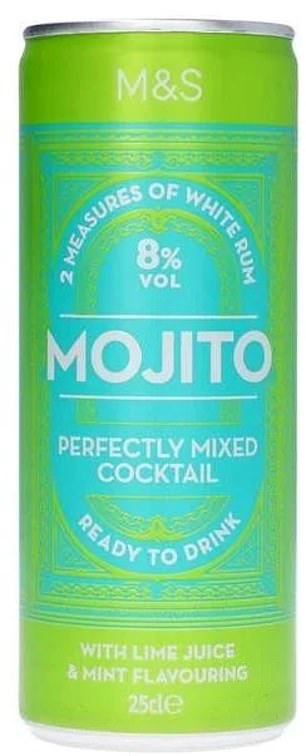Summer is well and truly here, bringing with it strawberries and cream, ice creams, day trips to the seaside… and the seductive ‘pshht-pop’ sound of a cocktail can opening.
No matter where you go, from barbecues and picnics to cinemas and commuter trains – everyone seems to be consuming ready-mixed drinks whether a simple gin and tonic or a more elaborate blood orange margarita. Their appeal is pretty obvious. They may just be re-imagined alcopops, but they’ve been cleverly rebranded to appear classy, sophisticated and fun.
As a result, the sort of people that wouldn’t dream of cracking open a can of lager on the train think nothing of lifting the ring pull on a can of porn star martini.
Their popularity means it’s also become increasingly common to ‘pre-drink’ them before social occasions, such as festivals, weddings and sporting events.

Britain has increasingly become interested in cocktail cans – but are they a slippery slope?
Last year I went to the Open Air Theatre in London’s Regent’s Park and, sitting on the grass outside beforehand, I was struck by how many people were sinking them prior to the performance.
In the UK the ‘RTD’ (ready to drink) market has more than doubled from around £228million in 2014 to an estimated £543million in 2024. Canned cocktails are now the second-highest selling type of spirits, behind vodka.
A decade ago you’d find a handful of them on supermarket shelves, now they take up entire sections and you’ll often see commuters grabbing one from the chiller cabinet on the way home, in the same way they would a can of soft drink.
The problem is that they’re often deceptively high in alcohol units.
A Gordon’s G&T has 1.25 units, while other canned cocktails can have up to two units – around the same as a glass of wine, that’s the recommended number of units per day for women (3-4 for men). Some of them are also only 150ml, meaning it’s easy to knock back two or three in a row.
Part of the reason for their surge in popularity must be down to the cost of drinks in pubs and bars.
A cocktail in a fashionable bar can set you back anything up to £20. Worryingly, that means more people are deciding to either ‘pre-drink’ before a night out or stay home altogether as it’s so much cheaper.
But where there is a natural curtailing of our drinking habits when we’re in a bar – we tend to pace ourselves and the bartender won’t serve anyone getting too inebriated – the guardrails are gone when you’ve got six tinnies in the garden.

The M&S mojito – one of Dr Max’s favourites and a popular choice for Britons
They’re designed to be moreish, meaning people underestimate quite how many units they’re consuming.
Before I sound like a total party pooper, let me say that I’m not averse to a chilled tinny myself. I love the mojito and piña colada ones by M&S; I just worry they are becoming part of a wider normalisation of drinking in our culture: where we think nothing of consuming half our weekly units before we head out for more.
Isn’t it remarkable how quickly these canned cocktails have become woven into the fabric of our social life, almost seamlessly replacing traditional drinks with their shiny, portable appeal?
Now school gate mums joke about having a ‘cheeky’ tinny in the afternoon to take the edge off, office workers knock them back before heading out for Friday drinks, and shoppers pick up multipacks in supermarkets along with their milk, bread and laundry detergent.
The ease with which they slip into our routines can mask a troubling reality that we’re turning into a nation of can-aholics! It’s something that’s known as ‘drinking without thinking’ – the mindless consumption of alcohol with no real appreciation for the damage it could be doing.
The question is: how long before this casual, seemingly harmless trend begins to take a toll on our health?
As with many things in life, moderation is key, but the convenience and aggressive marketing of these cocktails might be nudging us close to overdoing it.
No, autism doesn’t make you a sex pest

Former BBC presenter Gregg Wallace, who has been recently sacked by the Corporation
Sacked by the BBC, Gregg Wallace has blamed his inappropriate behaviour, which led to 63 complaints, on having autism. What an insult to all those who have this condition!
I have worked with hundreds of people with autism over the years and know only too well how the condition can result in many problems for the person – but being a sex pest isn’t one of them.
Mental health diagnoses are too easily used as a way to justify bad behaviour.
I’ve started to believe that one of the reasons people seem so keen on getting such a diagnosis is that they want to be able to blame an ‘illness’ for their bad choices rather than change their behaviour. It’s emblematic of a society in which we are encouraged to believe it’s always someone else’s fault and that you don’t have to take responsibility for the things you do.
I am horrified junior doctors are threatening to strike again, only a year after being given a 22 per cent pay rise – the highest public sector pay award in recent years.
Another walkout when the NHS is already on its knees will see the public turn against them – the same public whose taxes pay their wages. News that their pay demands would fund 31,000 nurses will not help matters.
Yes, junior doctors work hard but they are well paid compared to other graduates, get study leave, days off before and after night shifts and gold-plated pensions. Can it really be fair that those who are paying for the NHS can’t see a GP and languish on waiting lists, while young doctors are holding the country to ransom again? The poorest patients who can’t afford to bypass the mess and go privately will suffer the most.

DR MAX PRESCRIBES… ALLELUJAH
Available on BBC iPlayer and based on the play by Alan Bennett, this film has been described as a love letter to the NHS.
With a stellar cast (Judi Dench, Derek Jacobi, Jennifer Saunders) it manages to tread a careful line between being political and being extremely entertaining and informative, especially when it comes to how we treat older people.











